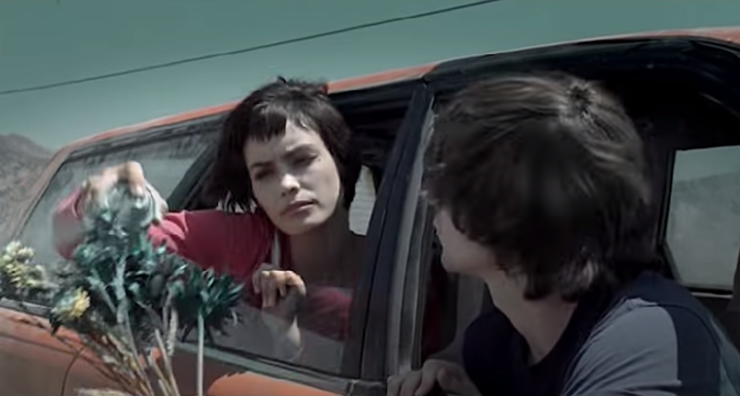Afterlife fantasies—from Dante’s Divine Comedy to Pixar’s Soul—have always been a unique way to look at society. In this short series, I’ll be looking at the film tradition of afterlife fantasies, and discussing the recurring themes and imagery across a century of cinema.
After focusing mainly on films that were either set in the 1930s and ’40s, or remakes of films set in the 1930s and ’40s, we are now, for better or worse, in a post-1980s world. In this entry we’re talking about Defending Your Life, What Dreams May Come, and Wristcutters: A Love Story, three modern films that posit unique takes on afterlives, and that mostly reject the clouds and angel stand-ins of the earlier movies. Here the afterworlds borrow heavily from the lands of the living.
[While all the films in this miniseries deal with death, this post discusses suicide at some length, so please tread cautiously if you need to.]
Take Me Down to Judgement City: Defending Your Life (1991)
Defending Your Life is an interesting case—an afterlife fantasy put through an Albert Brooks filter. Albert Brooks, who is one of the greatest stand-up comedians in history, honed an extremely specific comic persona by the time he started making short films for Saturday Night Live at the end of the ’70s. He carried variations on that persona into the ’80s with his first three films as writer/director: Real Life, in which he’s a neurotic, self-obsessed documentary filmmaker; Modern Romance, in which he’s a neurotic, self-obsessed editor trying to make sense of L.A.’s dating scene; Lost in America, in which he’s a neurotic, self-obsessed ad exec who splits his comfortable yuppie existence for a stab at belated hippiedom in an RV. The problem being that Brooks’ films aren’t comedies. They are deeply, often hysterically, funny, but they’re not comedies—they’re observations of life, of what it means to be “American”, and the struggle to be a good person in a world where you never really know what that means. The problem is that audiences go in expecting a comedy, and then they get something more akin to a thought experiment, and Brooks is one of the few U.S.-ian filmmakers dealing with the problems of American Exceptionalism? Look, I just love him, OK? If even one person reading this is inspired to have a Brooks marathon, I’ll defend my own life a lot more happily.
As I said, Brooks’ ’80s films took a scalpel to the materialism and selfishness of that era. (I’m guessing none of his characters voted for Reagan, but holy shit did they benefit from his economic policies.) With 1991’s Defending Your Life, he literally killed the character off just in time for the new decade. Rather than allowing his friends to celebrate his birthday with him, ad executive Daniel Miller chooses to spend it alone in his new BMW—a purchase he is already regretting, having seen a better, more expensive Beemer on the lot—blasting his music so loud other drivers yell at him. He swerves wildly, ignoring the needs of the rest of the road, and is so self-absorbed he drifts into oncoming traffic and crashes head-on into a bus.
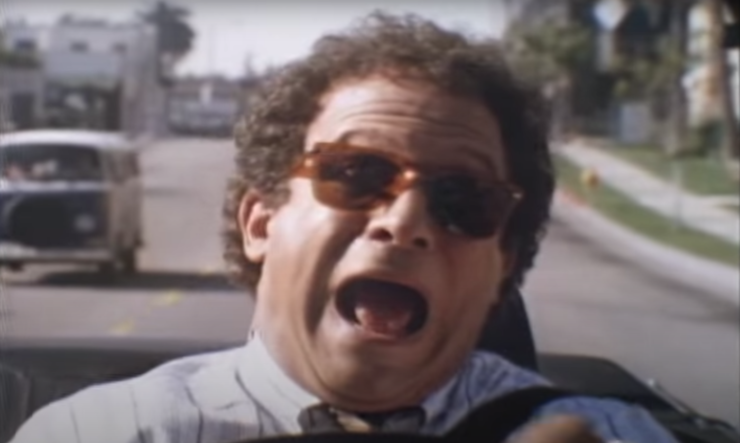
As metaphors go, it’s pretty clear.
Daniel finds himself in Judgment City, another Way Station approach to an afterlife. As in Heaven Can Wait, this post-death realm is meant to match what people are accustomed to, so death won’t be such a shock. Thus, Daniel Miller is in the Judgement City that serves the West Coast of the U.S. The newly dead are shuttled into Judgment City via trams—Brooks actually rented them for filming from Universal Studios. As they roll down a bright highway, they pass Judgment City’s billboards and listen to the guide explain the City, and then, delivered to their hotel rooms, he finds the channel about the hotel. This is the afterlife as banal, middle-class America. The big selling point of the City is that the food is incredible and people can eat as much as they want without gaining weight. Later, Daniel realizes that while he’s been assigned a Best Western-level hotel to stay in, his new paramour Julia was given a suite in a luxury building.
The next day he learns that the purpose of Judgment City is exactly what it says on the tin: he has to spend the next five days going through a highlights reel of his life in front of a pair of judges, who will decide whether to send him on to the next evolutionary step, or to send him back to Earth for another try. This sounds benign at first, until the part where he learns that if he gets sent back too many times he’s going to be discarded like a spare part that doesn’t work. The universe is revealed to be a vast, largely unknowable bureaucracy—less the finely-tuned pattern seen in the earlier film A Matter of Life and Death, and more a faceless corporation that optimizes on efficiency.

Guiding Daniel through this world is Bob Diamond, played by Rip Torn at his Rip Torn-iest. He’s essentially Daniel’s defense attorney, and has to make a case against a prosecuting attorney, Lena Foster (Lee Grant), except Bob refuses to call himself a lawyer. He keeps emphasizing that no one’s judging, and there are no right or wrong answers in Judgment City… but again, it’s called Judgment City. We figure out pretty quickly that Daniel does not have a strong case for moving on. And then we learn why. It’s not that there’s a moral framework you have to adhere to in order to avoid Hell—it’s that people who make their decisions based on fear aren’t ready to move on, and have to go back to Earth.
Brooks talked about his idea for the movie in a fantastic interview with St. Roger Ebert in 1991:
Here’s my answer. I think if there were a lottery about what the next world is like, I’d bet on this. A computer works by discarding all the wrong answers, and the remaining one is right. I approached the afterlife the same way. All I’ve ever seen in movies are clouds, and wings, and harps, and angels, and I said damn it! It’s gotta be something, but why is it that?
And now that the film is getting attention on its 30th anniversary, he mused on his cinematic afterlife again in an interview with Mark Olsen:
I can’t say that anything makes huge amounts of sense, but if one idea that you would have about death is that it’s literally nothing, that’s a hard sell. “And what would the movie be?” “Well, the screen goes dark and that’s it.” “OK. Well, let us think about it.”
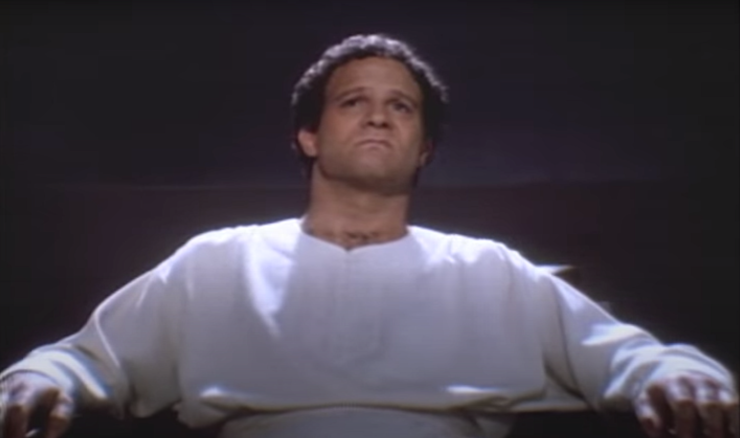
While Judgment City sounds like a far cry from fire and brimstone, or even having to watch your heart stack up against a feather, Daniel is overwhelmed with stress and shame, the sense that he screwed up his life. As the two attorneys choose as they build their cases with incidents from Daniel’s life, we see what led to the man who swerved into a bus. His decisions were all based on fear, self-doubt, and an obsession with knowing what other people think of him. He’s a product of the decade that popularized phrases like “Greed, for lack of a better word, is good” and “He who dies with the most toys wins”, and those “Justification for Higher Education” motivational posters that had neon-lit images of mansions with multiple sports cars parked out front—all signifier with no significance. Daniel measured his own life entirely by what he could afford, the status other people gave him or denied him.
Partway through his trial he tries to short circuit his prosecution by accusing them of putting too much emphasis on money, but as they explain, the issue is not whether he successfully campaigned for a raise, it’s that he caved to the first offer he was given rather than having self-respect and valuing his own skills and time more. When Daniel meets Meryl Streep’s Julia, who is an absurdly heroic woman who is definitely moving on, things get even more fraught. They both realize that what they feel for each other is a much purer form of love than they ever felt for any Earthly partners. Neither of them want to lose their connection, but how can they continue a relationship if Daniel’s going back to Earth and Julia’s heading forward into the unknown?
Defending Your Life, at its heart, is making the subtle argument that people should spend their lives figuring themselves out as themselves. Making decisions based on higher emotions than fear. Developing personalities beyond lists of things they own. Where I would say the film falters just a bit is in the way it chooses to dramatize this: a romance with an equally dead woman. Rather than showing Daniel getting in touch with himself, and learning how to love himself as himself, we watch him falling in love with Julia, eventually overcoming his own worst instincts enough to follow her into the next world, seemingly because he wants to be the kind of man who could deserve her love.
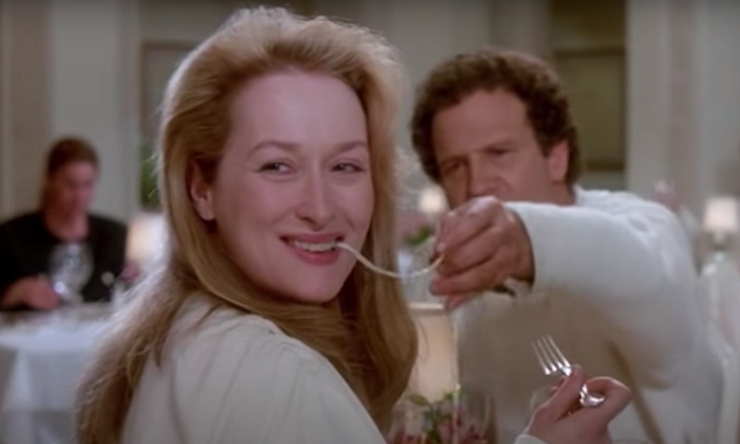
In many of the films I’ve looked at in this series, we’re shown a vague liminal space—a steamship, a cloudscape, a reception area—where people wait to go on to a fixed afterlife. Brooks takes a different approach with the vast, bustling, Los Angeles-esque Judgment City: the City is its own place, with its own culture and infrastructure, not merely a waiting room. We only see a few sections of the City, but between the television ads and billboards, and the occasional glimpses of Judgment City’s employees, you get the sense that he’s only showing us a fraction of a fully-formed society. And more than that, this society is just as harsh, in its own way, as the city Daniel just left. Judgment City bills itself as a resort city of golfing, casinos, and stables. Once Daniel arrives, he’s told repeatedly that as long as he’s in Judgement City, he can eat as much as he wants without gaining any weight. All of this creates a pleasant facade, a vision of a particular type of material paradise where people can have fun and stuff themselves forever.
But of course, this isn’t the truth. The truth about Judgment City, and the undercurrent of your stay there, is that you only get five days to sum up your entire life. You spend the majority of each day on trial, being put through an examination of your life by beings who are immeasurably smarter and more advanced than you, a fact they remind you of by calling you a “Little Brain”. All the stand-up shows and fancy dinners have to be crammed in at night, where, if it’s clear you’re going back to Earth, you try to spend your time forgetting how that day’s trial went, and how tomorrow’s will go. It’s…perfect? A perfect five-day workweek feeling, except instead of a weekend you get, um, judgement.
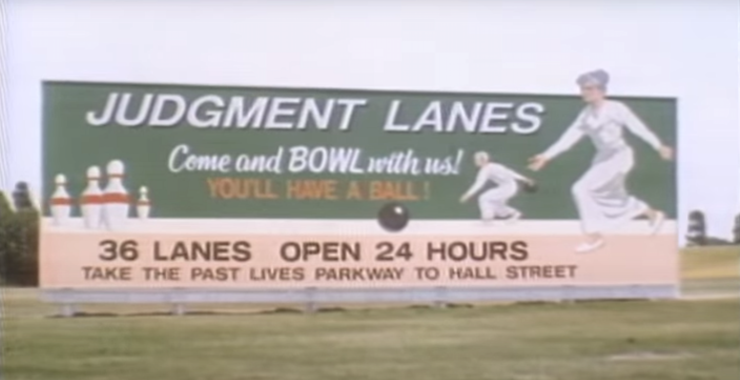
As in many of the films, we only see the liminal space from the limited perspective of the Judged. We watch a lot of Daniel’s trial, and even a scene from Julia’s, so we learn what the Judges value. But we never learn how they got to be Judges, who appoints any of these people, if there’s some sort of Executive Office somewhere, or an HR department. As in Outward Bound, Here Comes Mr. Jordan, and A Matter of Life and Death, the movie implies a vast bureaucracy keeping track of souls shifting between life, death, and various Judgment Cities. (As for Hell, when Daniel asks about that, Bob Diamond responds, “Actually, there is no Hell. Although I hear Los Angeles is getting pretty close.”) As in all of the movies I’ve looked at, we don’t actually know what “moving on” means. We don’t see the next world, or anything that would count as a traditional Heaven.
But, unlike in most of the earlier films, our individual fight against the system is ultimately successful. Daniel loses his case, Julia, of course, is sent ahead, all seems lost. But at the last possible moment Daniel escapes his Earthbound tram, runs across the tracks, and jumps onto the running board outside if Julia’s seat. He holds on despite being zapped by the tram’ electrical system, and then we see that Bob Diamond, Lena Foster, and the judges are watching the incident from the trial room. All four agree to let Daniel into Julia’s tram to continue with her.
Presumably they all knew to meet in the trial room, hoping that Daniel would be brave enough to break the rules—but how much of this was planned? Did they arrange for him and Julia to depart on neighboring trams, hoping he’d be pushed into conquering his fear? Were they monitoring his entire relationship with her, nudging him in the hope that he’d prove himself and move up?
Paint Me Like One of Your Dead Girls: What Dreams May Come (1998)
What Dreams May Come is a movie about a man who lives such a good life he goes to a Lord of the Rings calendar when he dies.
Chris Nielsen (Robin Williams) appears to be narrating his life, and if you didn’t know anything about the movie going in, you might think he’s just looking back from the vantage point of old age. But then both of his kids die, and then he dies, and then his wife dies, so maybe you think that he’s narrating from the afterlife, but then it turns out he’s actually narrating a new life he’s living, having been reincarnated on Earth to have another life with his wife.
His memories of happy times with his wife are sun-dappled, and dreamy. The bad times are grey… and dreamy. The memories with his kids are almost always very emotionally fraught moments. And there are reasons for that, but because his life looks like a painting and occasionally features slow-motion water fights with his hysterically laughing children (seriously) that once he gets to his similarly dreamy, impressionistic Heaven we can’t really get a sense of who he was before. The whole film felt so unreal that I couldn’t shake the feeling that he might abruptly wake up.
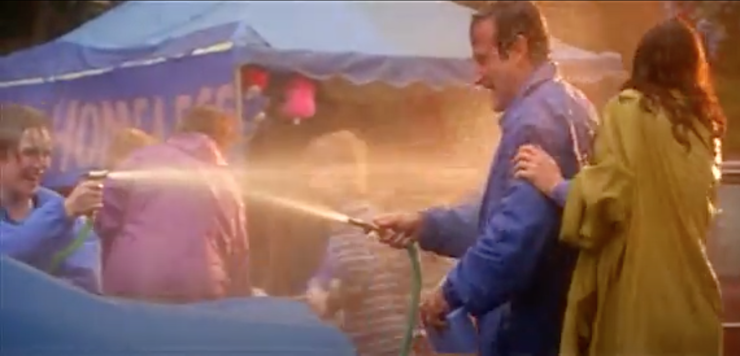
While the Richard Matheson novel was published in the 1970s, this film adaptation is the most ’90s take on the afterlife imaginable. It dispenses with a lot of the more New Agey and occult musings of the book to embrace an extremely individualistic, hyper emotional view of an afterlife. When Chris Nielsen dies, he tries to stay on Earth to take care of his wife, who is still reeling from the deaths of their children. His refusal to move on makes her grief even sharper, however, so he leaves with his guide, a blurry Cuba Gooding Jr-shaped man whom he calls “Doc”, and finds himself in an equally blurry pastoral environment. It soon becomes clear that this is his own highly-personalized heaven. The landscapes are based on his wife’s paintings—at first his surroundings are literally paint, and as he walks through fields he squishes plants and ends up streaked with different pigments.
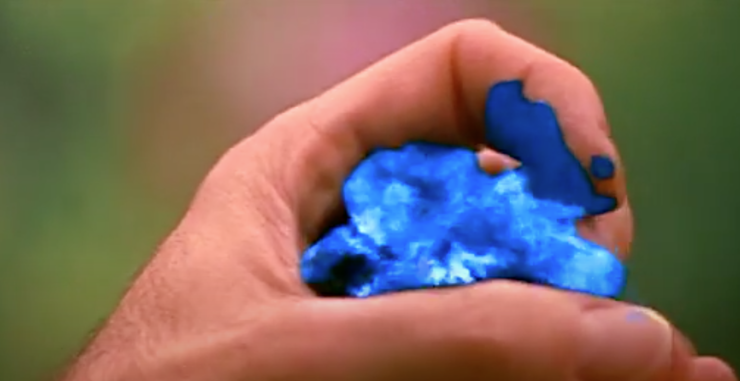
And I have to say, the narrative of What Dreams May Come fails for me, personally, but I love the concept of this afterlife. The various Heavens and Hells were mostly inspired by the work of Caspar David Friedrich and JMW Turner (The paint effects won an Oscar, and you can read more about their creation here), and make for an inventive afterworld that, like Brooks’ vision, doesn’t rely on angels or clouds. While “God” is name-checked, that particular being is never defined in any way, and the film is pretty much theology-free… aside from one interesting element that I’ll dig into in a moment.
In this cosmology, death is just a really intense therapy session. Over the course of the movie, Chris interacts with three guides, “Doc”, “Leona”, and “Tracker”. They explain the rules of the after world, walk him through it, and, eventually break the news that his wife has committed suicide and gone to “Hell” for violating the natural order. But more on that in a second. The movie gradually reveals that Doc and Leona are not merely guides sent to help Chris. Both of them are Chris’ previously deceased children, who have adopted questionable personae that reflect their complicated feelings toward their father. His daughter Marie appears to him as Leona, a flight attendant he complimented once when the family traveled to Singapore, and whom Marie then decided was the paragon of femininity. (We don’t have time to unpack all of that.) Meanwhile his son takes the form of “Doc”—confusingly revealed to be this Chris’ old mentor, Albert Lewis, but as Albert appeared as a young man. Once Chris recognizes his children, and reassures them that he loves them as they are, they flicker back and forth between their appearances. Then he meets the real Albert Lewis, but he’s taken the form of Max Von Sydow (does Chris feel an identification with Antonius Block? Or fear dentists? It’s unclear) and is called “Tracker”, who functions as Chris’ guide into Hell.
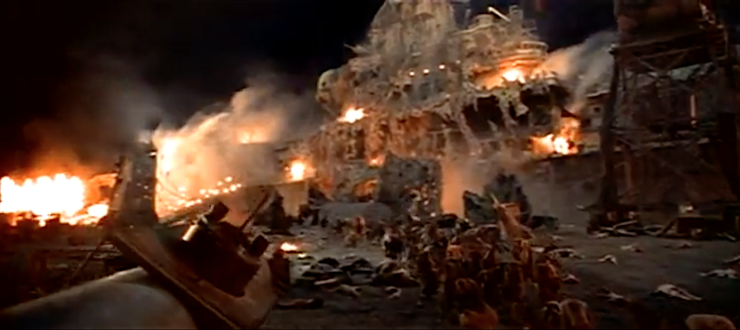
Chris meets Tracker in a massive library reading a huge leather-bound book, and it’s possible that the books are records of life and death, ala A Matter of Life and Death and Heaven Can Wait, but as the movie’s characters never directly tell us, they could just as easily be really nice copies of all the Ultimate Marvel Comics lines.
OK, about Hell. Annie is there either because she “violated the natural order” (according to whom?) or because Hell is simply peoples’ pain and guilt trapping them in an endless loop of self-recrimination. But Chris can go to Hell, see it as though it’s an objectively real realm, interact with the people there, and, finally, find his wife in an awesome haunted goth replica of their old home. (Once again I find myself enamored of the aesthetics of Hell.) Neither Doc nor Tracker ever tell us who’s keeping the records, and the movie seems to imply that Annie Nielsen is in Hell because she blames herself for her family’s deaths. But somehow seeing Chris succumb to the hopelessness of Hell snaps her out of her guilt loop—thing that according to the established rules of the universe shouldn’t even be possible. Isn’t it a little irresponsible to create an afterlife that’s all “Somehow, Palpatine returned” regarding your eternal soul?
Whatever. Somehow, they both wake up in Chris’ paradise. She’s reunited with her children, which would seem to be the culmination of the plot, but then Chris announces that they should both be reincarnated so they can meet each other again, then come back again to be with the kids.
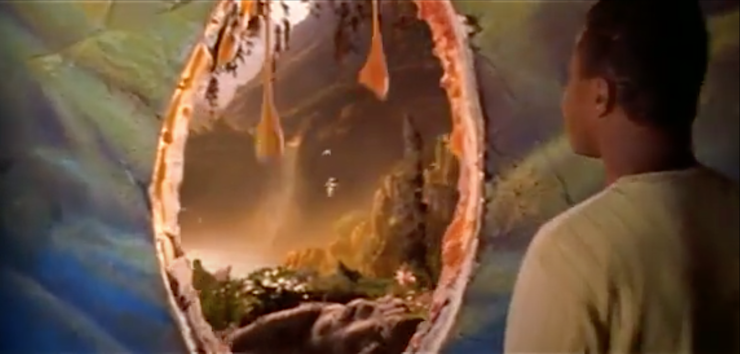
Chris’ whole plot revolves around having to fight the afterlife. First he doesn’t want to leave Earth because he doesn’t want to abandon Annie. Then, when it finally sinks in that he’s hurting her by staying, he’s ecstatic in his new Rivendell-ass Heaven. Which, yes, obviously. BUT THEN once he finds out that she won’t be joining him, but is instead trapped in Hell, he refuses to listen to any warnings about going after her. But since it’s never clear what the rules are, or what the consequences would be for breaking those rules, it’s like, I don’t know, watching someone in an MMA fight with a jello mold. When he decides to stay in Hell with Annie she simply seems to wake up to the fact that he’s truly there, and not a memory, but there isn’t any grand moment of decision as we’ve seen before in A Matter of Life and Death, or the more dramatic tram escape moment in Defending Your Life.
I Wouldn’t Exactly Say Painless: Wristcutters: A Love Story (2006)
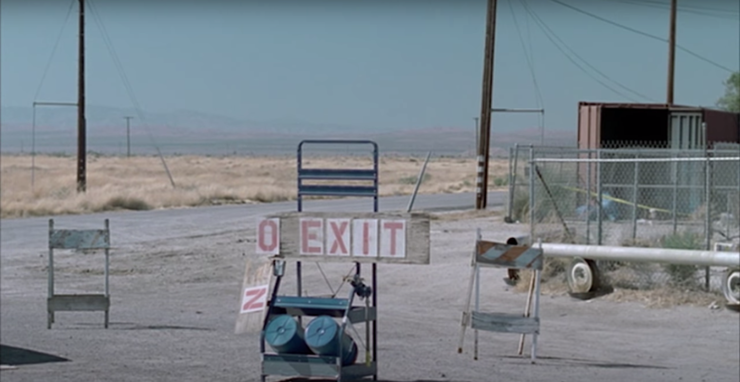
And now we come to our most recent film in this batch: Wristcutters: A Love Story, the most indie movie that ever indied.
When I say indie, what I mean is “Tom Waits plays a literal angel” indie. Half the cast are indie musicians and/or filmmakers. The main character’s sidekick is based on Gogol Bordello lead singer Eugene Hutz, one of the other main characters is named for the filmmaker Mikal P. Lazarev who also acts in the film, and the soundtrack includes multiple songs by real-world people who committed suicide (or, in the film’s parlance, “offed”). And the whole thing is based on an Etgar Keret short story.
The movie takes place in a way station for suicides. People aren’t exactly punished for suicide, but this world is just a slightly greyer, blander version of life on Earth. There are no stars in the sky, no one can smile, and people work dead-end jobs with no hope of change.
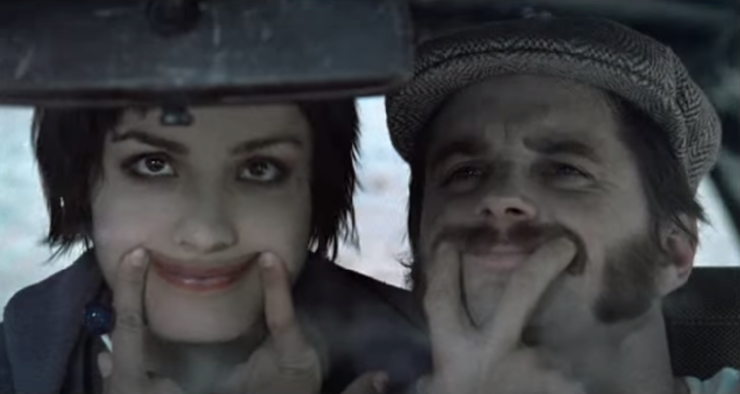
UNTIL! Main character Zia, who offed after his girlfriend left him, learns that she has now also offed, and sets off with his friend Eugene to track her down. They pick up Mikal, a hitchhiker who wants to talk to the People In Charge (PIC), whom most people think are a myth. Eventually the trio ends up at Kneller’s Happy Camp, where low-key miracles occur as long as you don’t care about them too much. Along the way they talk about their lives on Earth, and whether or not their deaths were mistakes.
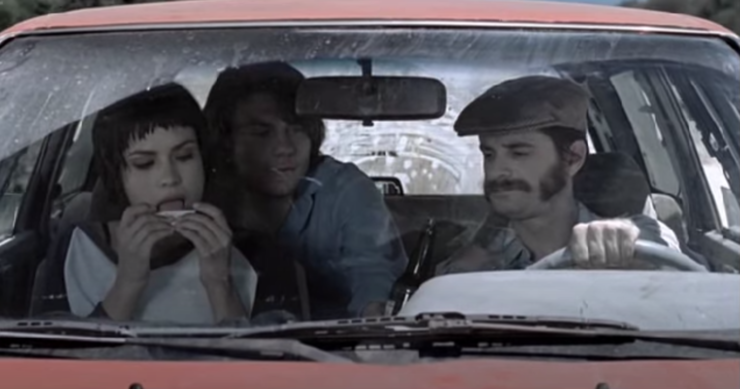
This movie is GREAT. And it continues two of the themes found in other afterlife films. First of all, suicide is Not Like Other Deaths. In Outward Bound and Between Two Worlds, the young couple who off together are going to be doomed to pilot a boat back and forth between life and death for all eternity. In What Dreams May Come those who commit suicide are trapped in an unending loop of psychic pain.
Here the entire world is made up of people who offed. People work dead-end jobs, but Zia and Eugene are able to pick up and go on their road trip with no ill effects, so it’s not like working at Kamikaze Pizza is the equivalent of being one of Dante’s moaning trees—Zia meets plenty of people, especially at the Happy Camp, who have created pretty nice lives in the land of the offed. The more interesting thing to me is the idea that people who have chosen to commit suicide get their own special world. We have no idea if there are other afterlives for people who die other deaths, if the PIC move between those worlds, if there’s a whole variety of specific afterlives for people who die different deaths. We get a sense of a giant bureaucracy as I’ll mention in a sec, but we don’t learn the details.
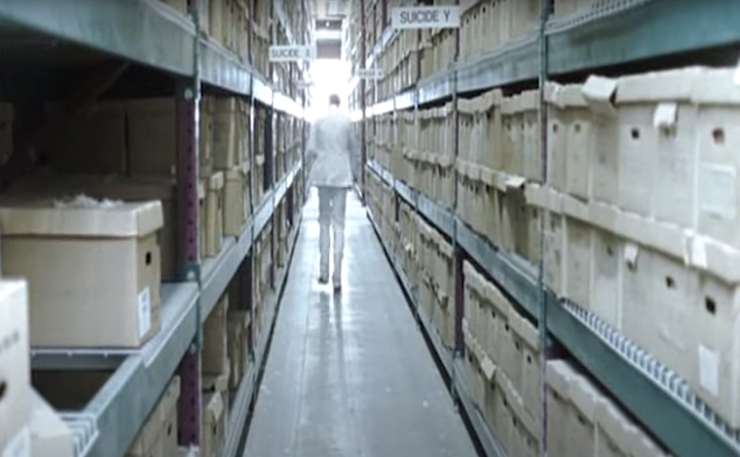
Wristcutters is very much on the “I’m too special for death” spectrum. Mikal insists she doesn’t belong there and deserves another shot at life. Zia accepts his fate until he realizes how much he’s given up by checking out early. And as in many of the other movies I’ve looked at, while the full design of the afterlife is kept hidden from the characters and the audience, the idea that human lives are being recorded in some way becomes central. After following Zia through a random job and a scattershot roadtrip, and watching Eugene mock Mikal for her belief in the PIC, our time in Wristcutters’ afterlife ends with a prolonged shot of a record room, which seems a bit scruffy, yes, but also alphabetized and enormous—implying that this is in fact a storehouse of every life and death. We see a PIC in a snow-white suit wandering through the warehouse until he finds Zia’s file. As he pulls the file down a small tangle of feathers swirls around him. Here we have not only the iconography of endless records of people a la Heaven Can Wait, A Matter of Life and Death, and, as we’ll see in the next essay, Soul—but also an ironically cheesy hint that the PIC are in fact angels in the classic “benevolent feathered being” sense. I also want to note that these files are organized by first name, a touching detail that makes the whole operation feel more personal, a warmhearted moment in a blackly hilarious film.
Anyway I love this movie, go watch it.
***
Visually, these three are the most inventive afterlives yet. Rather than cloudscapes, wing motifs, or even fogbound ships, we get three very different visions of afterlives, that are, at the same time, much more bound to experience of life on Earth. Defending Your Life gives us a pleasant urban sprawl—but it also tells us explicitly that Judgment City only looks like that because that’s what the Little Brains can handle. Wristcutters gives us a road trip through a June Gloom summer, dotted with diners and camps. And What Dreams May Come embraces the core concept of Hamlet’s soliloquy by showing us that an afterworld can be anything.
All three of these movies carry the basic humanism of Heaven Can Wait and A Matter of Life and Death into the future. The three afterlives we see are simply intensified versions of life on Earth—Judgment City is a (slightly) more pleasant Los Angeles where you can eat whatever you want, What Dreams May Come’s vision of an afterworld is grounded in the art of this one, and Wristcutters’ world is just a slightly bleaker Middle America. Albert Brooks, being a little cynical about the state of modern life, thinks that being sent back to Earth is the worst thing that can happen to a person, while the other two films present a return to Earth as a reward, or at least another chance to make the most of life. And all three land solidly on the idea that an individual human can absolutely fight fate, death, bureaucracy, the People In Charge, whoever. Fight hard enough and you might create a better future for yourself.
Next up, Soul puts a new (but familiar) spin on the afterlife, and breaks a few of the rules.
Leah Schnelbach thinks Defending Your Life should be taught in every high school in America. Come join them in the endless battlefield of Little Brains that is Twitter!










